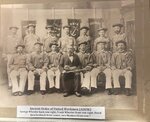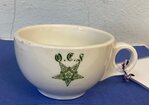





It was a day in the 1950’s and my mother seemed preoccupied. As she worked, she was memorizing something and kept reciting the words all around the house. After supper she did something truly extraordinary. She put on a floor-length white dress (we’d never seen her in a long dress before) and said she was going to “Lodge” and my sister and I were going with her. Once we arrived in West Concord, our mother led us to the Speckeen’s store (now part of Heritage Bank) and showed us stairs leading up to the second floor above Speckeen’s. She told us she’d be going upstairs, but what she would be doing was secret, and we would need to wait on the staircase. This was beyond intriguing to my sister and me. What we heard next captivated us. People were marching and chanting behind those closed doors and we just couldn’t fathom what was going on. I now understand our mother was participating in a ritual of the Order of Eastern Star, established in1850 for women closely related to a Mason, i.e daughter, spouse, sister, or mother.
The Masonic Hall above Speckeen’s, as well as the Odd Fellows Hall on the North side of Main Street, were busy places through the years. In 1897 there were no less than 8 secret societies meeting regularly in West Concord.Their meeting times were listed every week in the Enterprise. In 1908 there were 7 secret societies still regularly meeting in West Concord, but by 1925 only two remained active. By the 1950’s the Eastern Star may have been the only functioning Secret Society in West Concord.
Why were there so many secret societies in the early years of West Concord and across the U.S.? For the most part, these societies were formed as mutual aid societies who looked after the sick and needy of their membership and provided services at the burials of members, along with helping to provide for the welfare of family survivors of the deceased. The lodges also served as friendly community centers where social fellowship took place.
Which lodges were active in West Concord in its early days? The Masons of the Washington Lodge met two Saturday evenings a month at the Masonic Hall. The Lodge was named after George Washington who was one of 15 U.S. presidents to be a Free-mason. The Eastern Star, Concord Chapter, met in the Masonic Hall two Tuesday evenings a month at 7:30.
One of the most fascinating and progressive of these societies was the AOUW, the Ancient Order of United Workmen. At the Museum we have a wonderful picture of West Concord’s AOUW group in full regalia, with musician and music store owner, David Quackenbush, front and center. If any of you had Marian Monical as a teacher, David
was her grandfather. We are fortunate to have his violin at the Museum. The AOUW met the first and third Saturdays of the month and invited members in good standing from other lodges to join them. AOUW was established to serve men in the mechanical trades, but very quickly opened up membership to other occupations. A hallmark of AOUW is that it introduced fraternal life insurance benefits to its members. If a member of AOUW passed away, a death benefit was provided to the family. Then members contributed a dollar amount to rebuild the death benefit fund. AOUW lodges were totally dissolved nationwide in 1952 and are only a memory today.
A similar fraternal society was the Modern Woodmen of America who met every second and fourth Tuesday evenings of each month in West Concord. Inspired by pioneer woodmen who cleared the land to provide for their families, M.W.A. was established for social fellowship and to provided for families when the breadwinner passed away. Local Chapters of M.W.A. were known as camps, West Concord’s being Camp #2207. Men of certain professions were excluded from membership, including railway workers, miners, gunpowder factory employees, saloon keepers, liquor wholesalers, balloon pilots, sailors and professional baseball players. (I understand the risk in all those professions, except baseball). A man had to be young to join—between the ages of 18 and 45—another way to lower risk. They also had to reside in one of the 12 healthiest states of the U.S, deemed to be all midwestern states, including Minnesota. Unlike Ancient Order of United Workmen which no longer exists, M.W.A. is listed by Forbes magazine as one of the World’s Best Life Insurance companies in 2023, still serving its members well.
The Woman’s Relief Corps (WRC), chartered in 1883 as an auxiliary to the Grand Army of the Republic (GAR), met two Saturday afternoons a month in the Masonic Hall.
They remained active until the American Legion was founded in 1919 after World War I.
The Independent Order of Odd Fellows (IOOF) and their auxiliary, Daughters of Rebekah, had their own hall in West Concord. The men met every Wednesday night and the women two Friday nights a month.
Skimming through the Museum’s book of obituaries from the early 1900’s, I found many notations like these:
“The Odd Fellows of this place had charge of the funeral.”
“The remains were taken to Concord Cemetery, followed by the bereaved ones and a large number of sympathizing friends, where the Odd Fellows paid the last sad rites to their brother.”
“The sisters of the Rebekah Lodge, of which she was a member, attended in a body.”
“Interment was made in Evergreen Cemetery beside the body of his wife, who proceeded him in the Great Beyond just 18 months ago, the Masonic Order having charge of the services.”
Fraternal organizations in West Concord in the late 19th and early 20th centuries flourished both as mutual aid societies and social outlets. As people became more mobile, insurance became more common, and Social Security programs were instituted, membership in Secret Societies declined.
The IOOF still has Lodges throughout the U.S. Their mission statement reinforces why lodges were successful in West Concord and far beyond. It is “to promote good will and harmony amongst peoples and nations through the principle of universal fraternity, holding the belief that all men and women regardless of race, nationality, religion, social status, gender, rank and station are brothers and sisters.” A worthy mission, to be sure.
Please stop by the Museum to see some of our memorabilia from the heydays of lodges in West Concord. You’ll find them interesting.